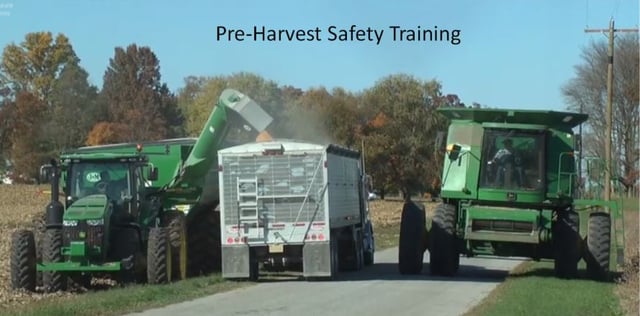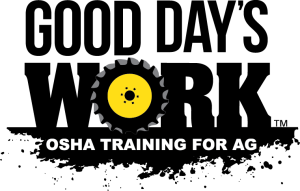Regardless of the crops you grow, harvest season is one of the most hazardous times of the year. There are a wide range of activities, extensive equipment operation, long hours, dust and chaff, multiple fire hazards, and time pressure that all increase the risk of injury.
It is imperative that you have a lengthy and deliberate discussion about these hazards with you entire crew.

Here are some of the key areas that must be covered:
- Who has the right-of-way? Pedestrians, 4-wheelers, pickups, grain trucks, field equipment, harvesters and other vehicles all compete for the same roadways.
- Traffic patterns: Train your employees to be extra-cautious about the equipment and vehicles on the farmstead or production areas.
- Dust and Obstructions: Never drive through heavy dust, even on a country road where your equipment is most of the traffic.
- Be Alert! NEVER use cell phones to text or call while driving!
- Communication: Remember to use good etiquette on radios and cell phones.
- Emergency Procedures: Review what to do in an emergency. Have contact information for all local emergency personnel available to everyone and discuss the immediate actions that should be taken in any emergency. Run a drill for one of your most-likely emergencies.
- FIRE! Harvest is normally a dry time of the year with dry residue, chaff and other combustibles in ample supply. Train what to do if a fire occurs, specific responsibilities of each person, and ensure that each vehicle has at least one fire extinguisher. Larger equipment should have more several placed in the most susceptible areas.
- Children: It’s great to have families living on your properties, but be sure to have a conversation with these children and their parents to discuss the dangers and changes in traffic patterns.
- Work Hours: The days get long and the weather can be our friend—or our foe. Set clear standards for hours worked and break times.
- Boredom and Fatigue: Equipment operators need to realize that boredom and fatigue can lead to accidents. Provide flexibility and a change of pace through their long days.
- New Equipment: Review new equipment that may have some inherent safety concerns.
- Parking: Discuss where to park, changes from typical parking areas, and being certain to not park near shops and equipment staging areas. Also cover where to park when in the field.
- Other Hazards: Discuss additional hazards that can occur during harvest such as moving augers around power lines, staying away from auger intakes, avoiding hot areas around dryers, working in confined spaces, combustion hazards, transporting fuel, etc.
End your training time with a discussion of other hazards that may have been missed, and having your more experienced employees share their words of wisdom.



